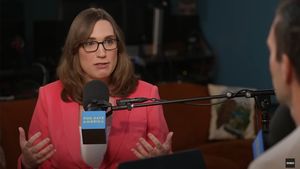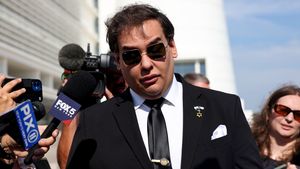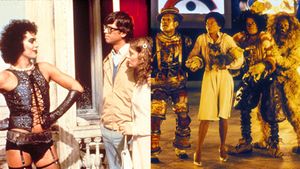There are a few ways to read Rhys Ernst’s directorial debut, Adam. The optimist will see the film as a criticism of the more toxic aspects of contemporary LGBTQ culture (the racism, colorism, transphobia, and biphobia) that still plague it to this day. The pessimist will take it on its face, seeing a story about a white, cishet boy who hoodwinks a lesbian into believing he’s trans just to get some ass. But I see it for what it is: a sloppy, ambiguous, and irresponsible cinematic retelling of a problematic book which is still uncomfortably close to its source material.
Filled with LGBTQ caricatures and nostalgia, it’s easy to take Adam at face value. Perhaps that’s what the film’s PR team intended: drum up controversy, have people see the movie at any cost, and hope they come away pleasantly surprised. I was certainly surprised, just not in the way they most likely hoped I would be.
The anger behind the film’s release from queer and straight folk alike is fully justified based solely on screenwriter Ariel Schrag’s poorly-executed 2014 novel of the same name. The film manages to circumvent some of the book’s faux pas, but at the cost of unwittingly introducing elements that will make you squirm.
Adam (Nicolas Alexander) is a high school junior who moves to the Bushwick neighborhood of New York City in the Summer of 2006 to live with his lesbian sister Casey (Margaret Qualley) and her two queer roommates Ethan (Leo Sheng) and June (Chloe Levine). This pre-woke era has no real mention of any gender or sexuality spectrums, and casual use of the F and T words are still in vogue. Casey takes Adam to various parties often leaving him to fend for himself, and while at these parties he’s often mistaken for a trans man. Moving through the crowds, Adam experiences all the awkwardness that comes with not just being a horny teenage boy, but also a clear outsider. Naturally, he doesn’t realize he’s feeling the same unease queer folks experience navigating the heteronormative world while being forced to assimilate to survive, so he does the same in order to not get pushed out of these spaces since they’re the only ones he’s got access to at his young age.

At one particular queer-themed party, he meets a lesbian college girl named Gillian (Bobbi Salvör Menuez), and the two hit it off. She doesn’t even ask how he identifies, just assuming he’s trans (because WHY would a cis straight boy attend a gathering exclusively for LGBTQ folks?), and because his horniness is more important than her needs, he doesn't bother to correct her and inform her that he is, in fact, cis.
The premise of Schrag's original book is despicable with its level of deception and the acceptance of that deception at the expense of women. The ending of the film changed this element, but those changes don’t improve the overall story because the "coming of age" aspect is used to dismiss Adam's awful behavior.
There are several scenes of Adam watching videos about the transitioning process on YouTube, (back when videos like this weren’t censored yet), and viewers are led to think all of this is happening because he wants to learn about trans identity in earnest, but he’s only doing it to maintain the lie so he doesn’t blow his cover. He never receives full recourse for his actions, and I’m dog tired of watching straight, white, cis male protagonists use marginalized communities for personal gain just because the plot says their growth is more important than reality. We all know if the "deception" were the other way around and a trans woman was hiding her gender identity from a cis man, she would be at a risk of retaliation—and there is a scene where we see just that.
Adam, his visiting hometown friend Brad (Colton Ryan), Casey, and June watch a news story about a trans woman of color who was murdered because she "lied" to a man. It doesn’t occur to this group of queer WASPs that death and trans identity can go hand in hand—especially for women of color. While the group is trying to mourn this televised tragedy, Brad puts on his clown shoes and says something close to "Well if she didn’t lie, she wouldn’t be dead." Under peer pressure, Adam agrees with this logic. Too bad reading all those books and watching those videos didn’t grant him enough empathy for the plight of trans individuals to stand up to his simple friend.

The film concludes with Gillian confessing she knew Adam was cis all along and accepting the situation because she was trying to prove something to herself. Sexuality is a spectrum, and people are free to change their minds at any time, but the movie never dives deep enough to explore why she made this decision. Did Gillian like being with Adam? Has she been thinking about a relationship with cis men for a while? Did she feel like she had to stay a gold star lesbian because the whole country already knew her as one? We don’t know much about her because her main reason for existing is to be the receptacle for his lies.
I usually don’t seek out the perspectives of others before forming my opinion on a film, but I had a mighty need to watch Ernst’s interviews and read what trans film critics are saying about the movie. Many appreciated that the film was willing to take a risk and attempt to subvert the "trans deception" trope, but what no one mentioned is the lack of representation. Yes, there are queer and trans folks of color with a few lines, but this film remains a great study in the difference between visibility and representation. But the film isn’t meant for PoC, so the lack of representation isn't surprising.
There isn’t anything revolutionary about the direction or editing, either. The film relies more on dialogue and characters, but they are all in service to the title character’s narrative, though even he lacks development. What does work is Ernst’s ability to capture 2006 New York perfectly. From the awkward dialogue, janky clothing choices, and period-appropriate cell phones (even a T-mobile Sidekick appears!), the nostalgic elements are handled with care and consideration.

The book is a hot problematic mess, so I get Ernst’s desire to rework the plot and create a better conclusion. However, the movie relies too much on the message of hope and progress and doesn’t go deep enough into what that looks like for the title character or anyone around him because they can’t evolve past the tropes they’re confined to. What is Adam supposed to be learning? What is the audience supposed to learn from watching this? Walking out of the theater, I realized I left the theatre more confused than when I walked in.


































































































































